Low-cost MIPS board targets wired, wireless routers
Mar 17, 2005 — by Henry Kingman — from the LinuxDevices Archive — views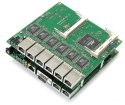 MikroTik has launched a line of inexpensive, low-powered SBCs (single-board computers) for wired and wireless routers. The RouterBoard 500 series starts at $140, runs Linux, and features twin mini-PCI sockets and triple Ethernet ports. An optional daughtercard adds four mini-PCI and six Ethernet ports.
MikroTik has launched a line of inexpensive, low-powered SBCs (single-board computers) for wired and wireless routers. The RouterBoard 500 series starts at $140, runs Linux, and features twin mini-PCI sockets and triple Ethernet ports. An optional daughtercard adds four mini-PCI and six Ethernet ports.
The first RouterBoard model, the 532, features a MIPS-based SoC (system-on-chip) with a 333MHz MIPS 4Kc core (400MHz optional). The core is optimized for integer operation, MikroTik says, with an MMU (memory management unit), but without an FPU (floating point unit). It includes a hardware watchdog timer.
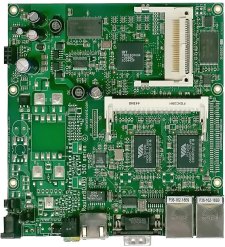
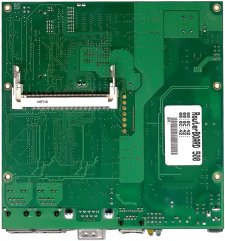
RouterBoard 532, top and bottom
(Click each image to enlarge)
The 532 features soldered-on RAM and Flash chips, including 32MB of DDR RAM and 64MB of NAND Flash. A 1Mbit Flash chip houses a RouterBoot bootloader, which outputs to a serial console port and can be configured to boot a kernel over the network after using BOOTP or DHCP to obtain an IP address. RouterBoot has been tested with DELO and a 2.4 Linux kernel, but should work with other Linux loaders as well, MikroTik says. Storage expansion is available through a CompactFlash slot that supports Type I and II cards, including microdrives.
The 532 board includes three Ethernet ports, including one IDT Korina and two VIA VT6105s, all of which support Auto-MDI/X, a feature that autodetects whether attached cables are normal or cross-over. The board supports 12V or 48V DC mode IEEE802.3af Power-over-Ethernet, as well as passive non-standard PoE, MikroTik says. A jumper toggles the board between 11-24V or 25-56V DC operation. The board draws a maximum of 4.25 Watts, or 14 Watts when used with 3.3V mini-PCI devices, the company claims.
The board includes two mini-PCI Type IIIA/IIIB slots and one DB9 RS232C asynchronous serial port. It measures 5.51 inches square (14cm), weighs 4.9 ounces (140grams), and can operate between -20 and 70 degrees Celsius, and with relative humidity up to 70 percent, non-condensing.
The RouterBoard also includes a 68-signal “Daughtercard Connector” (not populated in the board shown in the photos at the top of this article), which implements a system expansion bus. Several daughtercards are planned, according to MikroTik. The model 564 daughtercard, when available, will include six Via VT6105 10/100 Ethernet ports supporting Auto-MDI/X, and four Type IIIA/IIIB MiniPCI slots. The model 502 daughtercard will offer two Type IIIA/IIIB MiniPCI slots.
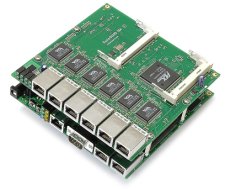
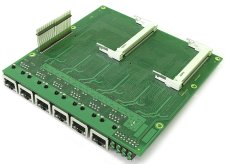
RouterBoard 564 daughtercard, top and bottom
(Click each image to enlarge)
MikroTik sells the RouterBoard 500 pre-installed with its custom RouterOS. RouterOS is based on Linux, along with a custom-built CLI (command-line interface) and other features, according to Mikrotik's Normund Rustanovic. “RouterOS is based on linux, but it's not exactly a linux distribution. It has a lot of our own stuff on top of it, and it has some interesting features noone else has,” Rustanovic said.
A reference Debian GNU/Linux image and source code are available from MikroTik for the board.
Availability
The RouterBoard 532 is available now, with prices starting at $140, depending on PoE options.
This article was originally published on LinuxDevices.com and has been donated to the open source community by QuinStreet Inc. Please visit LinuxToday.com for up-to-date news and articles about Linux and open source.